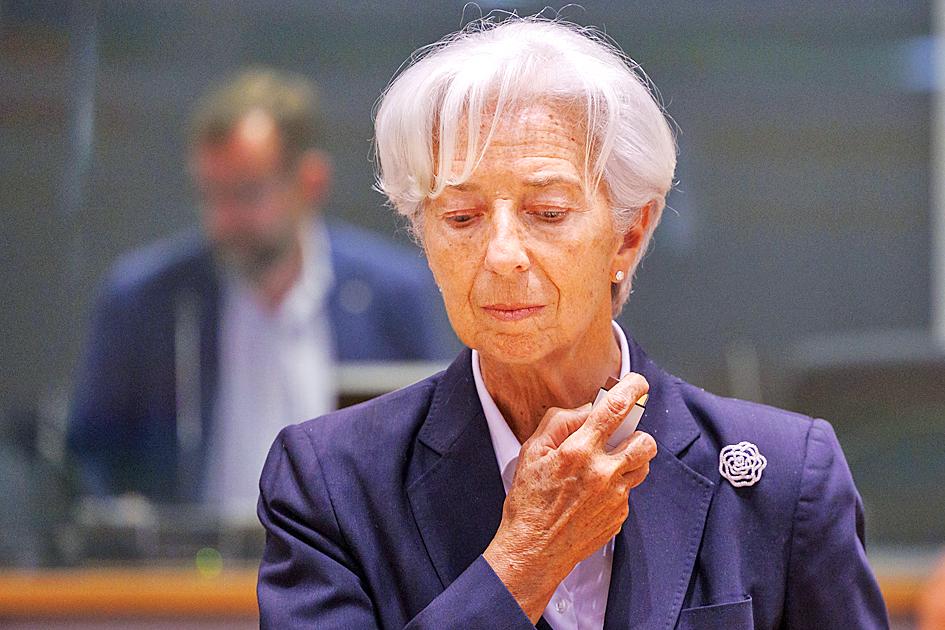The European Central Bank (ECB) would not be rushed into withdrawing monetary stimulus as officials act to contain inflation running at almost four times their 2 percent target, ECB President Christine Lagarde said.
“I don’t think that we’re in a situation of surging demand at the moment,” she told Francine Lacqua on Bloomberg Television from the World Economic Forum in Davos, Switzerland, yesterday.
“It’s definitely an inflation that is fueled by the supply side of the economy. In that situation, we have to move in the right direction, obviously, but we don’t have to rush and we don’t have to panic,” she said.

Photo: AP
Lagarde spoke a day after laying out her vision for the central bank’s next steps in a blog post.
The ECB is likely to exit negative monetary policy by the end of the third quarter, with a first interest-rate increase set for July, she said.
That prospective timetable signaling two quarter-point interest-rate hikes in the third quarter has irked some colleagues, because it would effectively exclude moving with a half-point increment, according to people familiar with the matter.
Some officials, including Bank of France Governor Francois Villeroy de Galhau, have also suggested that the ECB might end the year with positive interest rates. Traders are wagering on four 25-basis-point hikes by the ECB by the end of this year.
“When you’re out of negative, you can be at zero, you can be slightly above zero,” Lagarde said. “This is something we will determine on the basis of our projections, on the basis of our forward guidance.”
Lagarde refused to be drawn on whether the central bank might consider a 50 basis-point move.
Policymakers are walking a fine line as Russia’s invasion of Ukraine sent prices surging while denting confidence among businesses and households. New COVID-19 restrictions in China are putting additional strains on supply chains.
However, the ECB president downplayed the risk of an economic contraction, saying “for the moment, we are not seeing a recession in the euro area.”
She cited unemployment “at rock-bottom rates,” large household savings and the prospect for a strong summer for the tourism industry as forces that would offset negative shocks from the war and record inflation.

To many, Tatu City on the outskirts of Nairobi looks like a success. The first city entirely built by a private company to be operational in east Africa, with about 25,000 people living and working there, it accounts for about two-thirds of all foreign investment in Kenya. Its low-tax status has attracted more than 100 businesses including Heineken, coffee brand Dormans, and the biggest call-center and cold-chain transport firms in the region. However, to some local politicians, Tatu City has looked more like a target for extortion. A parade of governors have demanded land worth millions of dollars in exchange

An Indonesian animated movie is smashing regional box office records and could be set for wider success as it prepares to open beyond the Southeast Asian archipelago’s silver screens. Jumbo — a film based on the adventures of main character, Don, a large orphaned Indonesian boy facing bullying at school — last month became the highest-grossing Southeast Asian animated film, raking in more than US$8 million. Released at the end of March to coincide with the Eid holidays after the Islamic fasting month of Ramadan, the movie has hit 8 million ticket sales, the third-highest in Indonesian cinema history, Film

BIG BUCKS: Chairman Wei is expected to receive NT$34.12 million on a proposed NT$5 cash dividend plan, while the National Development Fund would get NT$8.27 billion Taiwan Semiconductor Manufacturing Co (TSMC, 台積電), the world’s largest contract chipmaker, yesterday announced that its board of directors approved US$15.25 billion in capital appropriations for long-term expansion to meet growing demand. The funds are to be used for installing advanced technology and packaging capacity, expanding mature and specialty technology, and constructing fabs with facility systems, TSMC said in a statement. The board also approved a proposal to distribute a NT$5 cash dividend per share, based on first-quarter earnings per share of NT$13.94, it said. That surpasses the NT$4.50 dividend for the fourth quarter of last year. TSMC has said that while it is eager

‘IMMENSE SWAY’: The top 50 companies, based on market cap, shape everything from technology to consumer trends, advisory firm Visual Capitalist said Taiwan Semiconductor Manufacturing Co (TSMC, 台積電) was ranked the 10th-most valuable company globally this year, market information advisory firm Visual Capitalist said. TSMC sat on a market cap of about US$915 billion as of Monday last week, making it the 10th-most valuable company in the world and No. 1 in Asia, the publisher said in its “50 Most Valuable Companies in the World” list. Visual Capitalist described TSMC as the world’s largest dedicated semiconductor foundry operator that rolls out chips for major tech names such as US consumer electronics brand Apple Inc, and artificial intelligence (AI) chip designers Nvidia Corp and Advanced